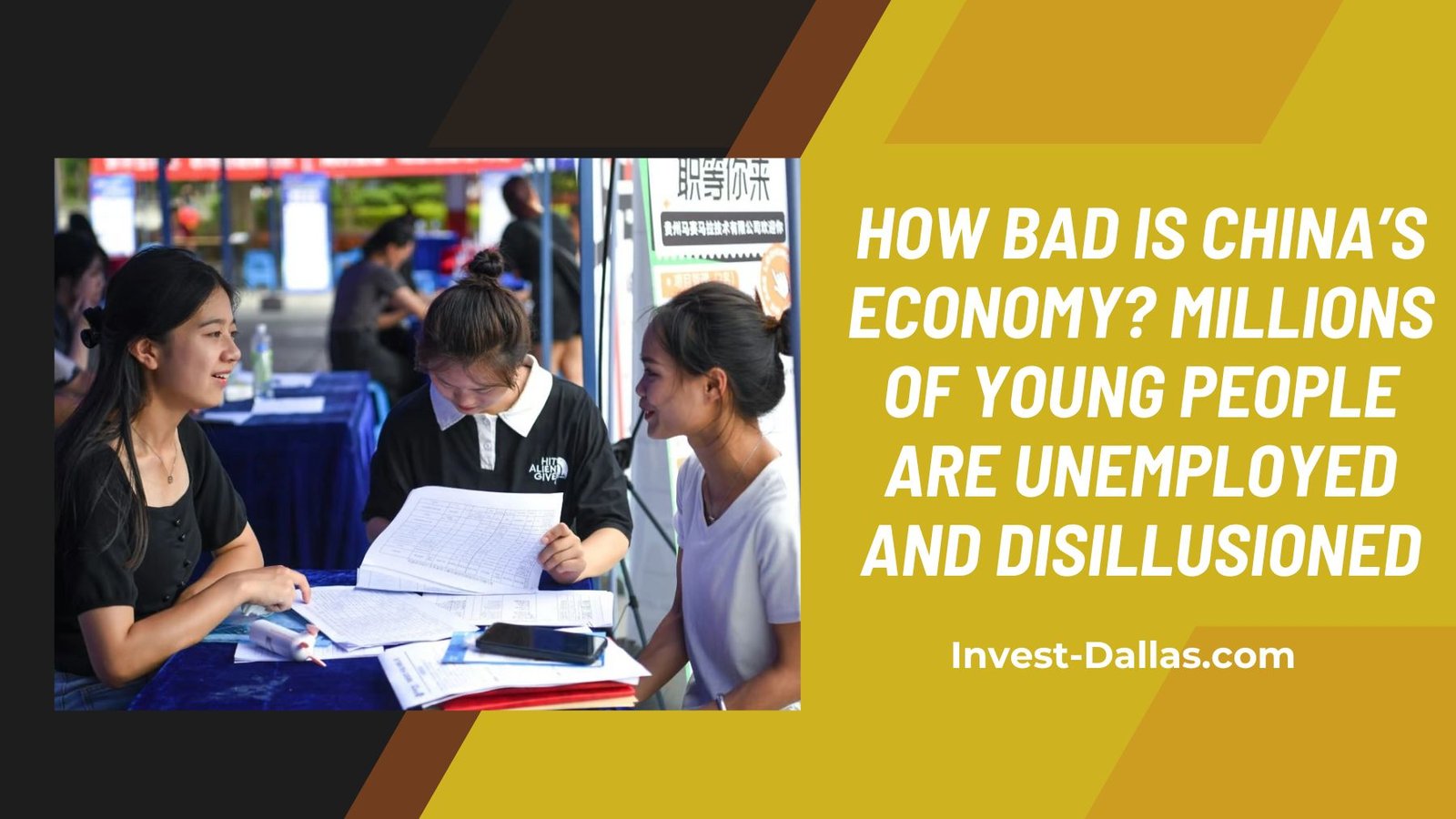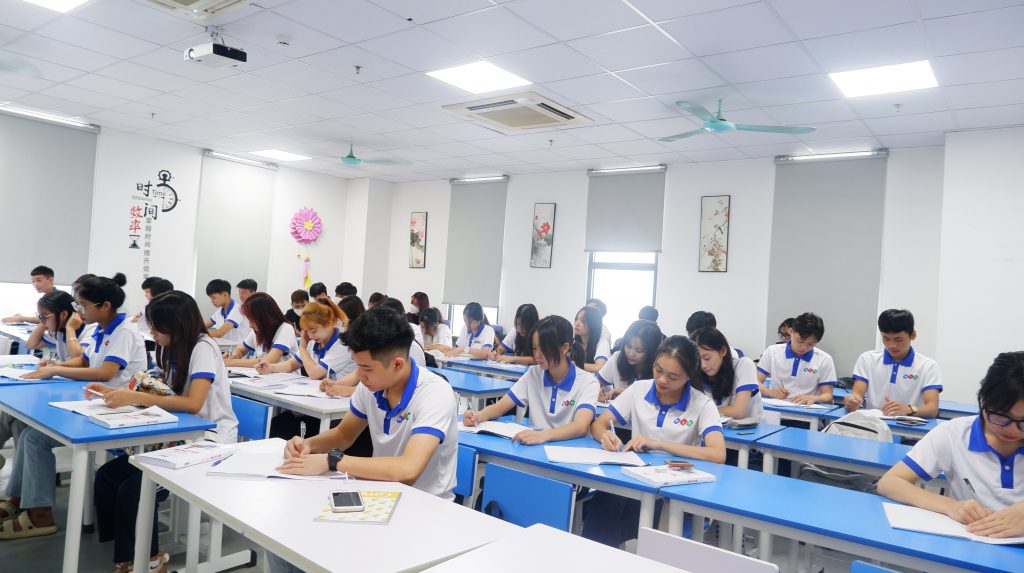
How Bad Is China’s Economy? Millions of Young People Are Unemployed and Disillusioned
How Bad Is China’s Economy? Millions of Young People Are Unemployed and Disillusioned
More than one in five young people in China are jobless. The government casts much of the blame on the job seekers themselves, insisting that their expectations have gotten too high.
Young people need to stiffen their spines and embrace hardship, says leader Xi Jinping, who labored in the countryside in China’s Cultural Revolution. If they can’t find jobs they want, they should work on factory lines or engage in poverty relief in rural China.
The government’s guidance is ringing hollow with many young people. Growing up in a period of rising prosperity, they were told that China was strong, the West was declining and endless opportunities awaited them. Now, with the urban youth unemployment rate hitting a record of 21.3% in June, their employment frustrations are posing a new challenge to Xi and his vision for a more powerful China.
For the estimated 11.6 million college graduates in 2023, having heeded calls by the state to study hard, the prospect of resorting to the physical labor that many of their parents performed is distinctly unappealing.
China’s State Council Information Office, which handles media inquiries for senior leaders, didn’t respond to a request for comment.
In the city of Hefei, a hub of universities 250 miles west of Shanghai, 23-year-old Liu Xingyu chafes at the criticism by older people that Chinese youths are too picky.
“They’re not from our generation, and they don’t understand us, so their opinions don’t matter much to us,” said Liu, who recently quit her first job out of college a few months after starting and joined the ranks of China’s young unemployed.
Liu studied communications engineering at college because she saw it as a practical choice that would help her secure steady work. As graduation neared, the best she could find was a cellphone sales management training program at a shopping mall, earning the equivalent of $630 a month, about half the city’s average income. When the company later offered her a full-time gig, she said, it wanted to cut her base salary by more than half, prompting her to quit.
The problem isn’t that jobs don’t exist in China. They do. With its shrinking population, China needs workers as much as ever. It is that China’s weakened economy isn’t producing enough of the high-skill, high-wage jobs that many college students have come to expect.
This is especially so after Xi’s targeting of the private sector in recent years with regulatory crackdowns on technology and other companies.
Disenchanted, many young people are opting out of the job market entirely, or “lying flat,” as many of them call it. Chinese media has recently featured articles about young “drifters” who live hand-to-mouth and pick up odd jobs as they roam the country.
Many of those who still want to work have soured on the private sector, with surging numbers of people sitting for the country’s civil-service exam for a chance at a low-paid, but stable, role in China’s bureaucracy.
The true level of China’s unemployment rate for young people ages 16 to 24 may be even higher than indicated by official data. Zhang Dandan, a Peking University economist, estimated the real youth unemployment rate in March could have reached 46.5%, compared with the official figure that month of less than 20%, if the millions of people who aren’t participating in the workforce also were counted.
For now, the mood among the young unemployed is more apathy than anger, especially with many parents pitching in to cover their living costs.
Longer term, the risk is that millions of unemployed people will lose the ambition China needs to achieve Xi’s goal of rejuvenating the country as a great power, and will struggle on the fringes of society as potential threats to the Communist Party.
Without stable work, many Chinese are putting off getting married and having children, worsening the country’s demographic problems. Some scholars warn about the emergence of a class of “new poor” in China who live off their parents, and could destabilize society.
“Because the ‘new poor’ have long been living in exclusion, oblivion and boredom, their main mental states have become irritable, antisocial and violent,” said Sun Feng, a Tsinghua University sociologist, in a recent commentary on a prominent party website. “These will be the primary factors that breed social instability.”
Asked recently about the joblessness of young people, China’s Minister of Education Huai Jinpeng said Xi attached considerable importance to the issue of unemployment. Huai said that conceptions of work were changing in China, with some young people seeking more flexibility.

“But at the same time, we prefer a more positive view of employment, understanding society, dedicating youth and creating value through practice and employment,” he said.
While Xi retains widespread popular support in China, some young people’s frustrations about his tight control on society and the economy burst into the open last November when street protests over the country’s Covid policies erupted in Beijing, Shanghai and other cities.
Job-market anxiety was evident in Hefei last week, where thousands of graduates flooded into a jobs fair organized by the local government. Companies advertised sought-after office roles such as in graphic design or account management. Images of Xi mingling with students flashed on a large screen overhead.
With so much competition, companies could be picky.
“Dude, you might not be the right fit,” the recruiter of a popular local restaurant chain told one young man, who then walked away.
Across town, a recruitment center that helps job seekers land factory work was practically deserted. Many young college graduates don’t want to work on assembly lines, said Wu You, an employee of the recruitment center, even though such jobs can pay as much as or more than entry-level white-collar ones.
On social media, some college graduates have been posting photos of themselves lying face down in their graduation gowns to show their malaise. Others compare their situations to a well-known character from Chinese literature, Kong Yiji, a self-styled intellectual who resorts to petty theft after failing to secure work with the government.

Overall, China’s official urban unemployment rate is just 5.2%. Young people are getting hit much harder for a mix of reasons tied to China’s economic outlook and structural issues in the country’s labor market. Some of those problems have been exacerbated by government actions.
China’s economy grew just 0.8% in the second quarter compared with the first three months of the year, an anemic rate that showed how the country, hamstrung by heavy borrowing and a property-market downturn, is struggling to regain momentum after the pandemic. Instead of investing in projects that would create new jobs for college graduates, many companies have been focused on paying down debt. The government has cracked down on sectors that were traditionally big employers of young people, such as technology and real estate.
Yet higher-education enrollment has continued to expand. In the past three years, more than 28 million college graduates entered the labor market, accounting for about two-thirds of the new urban labor supply.
That has created a mismatch between the jobs young people want and the ones available. Research by the online recruitment firm Zhilian Zhaopin found that a quarter of Chinese graduates this year were seeking work in the technology space, more than double the level of the next biggest category, even though some of China’s biggest tech companies have had layoffs.
Meanwhile, the government has reported the greatest worker shortages in blue-collar jobs such as manufacturing and in low-paid service ones such as housekeeping, which college graduates are less willing to accept.
With relatively few jobs in higher paying fields, college students nearing graduation often find themselves competing against graduate students—and companies tend to hire the latter, Zhilian Zhaopin found.
For those who do land jobs, the working environments can be grueling. Chinese tech companies are famous for pushing employees 12 hours a day, six days a week. At state-owned firms, some employees must study Xi Jinping Thought alongside their day jobs.
In Hefei, two recent graduates who snagged internships at a local bank said they are required to participate in group physical exercise each day and hand over their cellphones while at work.
At the jobs fair in Hefei, recent graduate Han Jiahao said he dreamed of working as a photographer and that many other young people like him sought greater independence in their work lives.
While stable work might be better for raising a family, he said, the relative autonomy of being a photographer was appealing because it would leave him less exhausted at the end of the day.
At the jobs fair, Han said, a teacher he consulted encouraged him to find a practical job first and then consider pivoting to photography later. “University students typically prefer to be free,” Han said.

China’s government has said it is working to address youth unemployment. At an April meeting, the party’s Politburo called on the country to expand job opportunities for college graduates. Local governments have rolled out programs such as providing subsidies for companies that hire recent graduates and special loans to help graduates start companies.
Those efforts don’t address the underlying economic weaknesses preventing many companies from hiring more people. Although Beijing last week unveiled 31 guidelines aimed at bolstering the private sector, which could improve hiring, many analysts remain skeptical after seeing the tightened control of private enterprise during the first decade of Xi’s leadership.
Popular government slogans, such as “get a job first, then find a career,” run counter to what many parents want for their children—a more comfortable work life than they had.
The Chinese government’s recent messaging, by contrast, extols the virtues of factory work and toiling in the countryside, and urges graduates to adopt what officials call “the correct outlook” on jobs.
“The more ambitious you are, the more down to earth you need to be,” the Communist Party’s People’s Daily said earlier this month.
Liu, the 23-year-old woman who landed work in cellphone sales, said she initially viewed the job as providing stability, after having dealt with the uncertainty of the pandemic for three years.
After Covid hit, Liu recalled, classes moved online, and she was largely confined by school administrators to her dorm room, with three roommates. She struggled to focus and received average grades.
When it came time to graduate, Liu landed interviews for promising jobs at a state telecommunications company and the Chinese appliance manufacturer Midea Group. But neither job came through.
She accepted the cellphone sales training offer as a fallback. She was relieved to have a job, but also felt that her engineering studies were going to waste.
“A lot of times I would find myself thinking, what’s the point of going to college if I’m going to end up doing this?” Liu said.
When the full-time job offer arrived, she balked at the base salary, which was less than half what she had been earning as a trainee. Slow sales meant that even after commissions, her total take-home pay likely would be less than she earned while in training, she said.
Dejected by the offer, Liu quit.
“It was a joy when I left that job, not having to suffer in that position,” she said.
Liu doesn’t have any immediate plans to start working again. She said she planned to buy books to study for the civil-service exam instead.
Source: https://www.wsj.com/articles/china-youth-unemployment-xi-jobs-522028c5?mod=hp_lead_pos7







